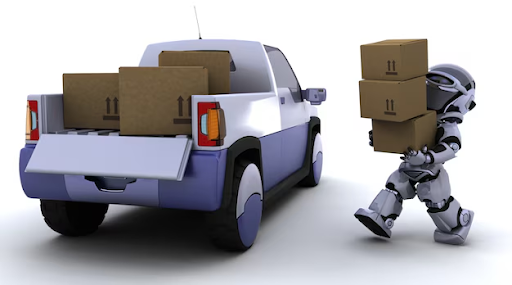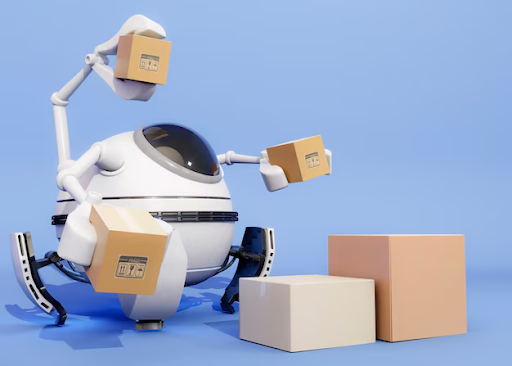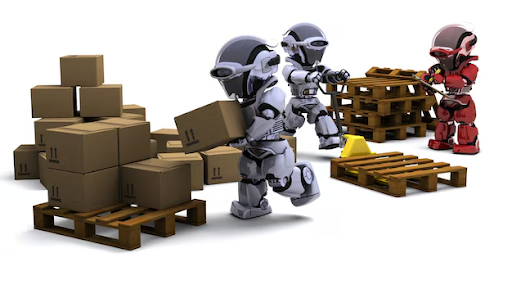In this article, we will explore how AI is helping logistics companies optimize freight transportation, the outstanding benefits, and the challenges in the process of applying this groundbreaking technology.
1. What is AI in logistics?

1.1 What is artificial intelligence (AI)?
Artificial Intelligence (AI) is a branch of computer science focused on creating computer systems capable of performing tasks that typically require human intelligence, such as learning, problem-solving, language recognition, and decision-making.
Core AI technologies:
- Machine Learning: A computer system's ability to learn from data without being explicitly programmed.
- Deep Learning: A branch of machine learning that uses artificial neural networks to model complex data.
- Natural Language Processing: Allows computers to understand and process human language.
- Computer Vision: Allows computers to understand and interpret information from images and videos.
1.2 Why is AI important in logistics?
The freight transportation industry is undergoing a revolution thanks to the application of AI. Artificial intelligence brings superior benefits compared to traditional methods, helping transportation businesses optimize operations and enhance efficiency.
Processing large amounts of data
Logistics industry generates a large amount of data, from information about goods, customers, vehicles, to data about traffic and weather. AI has the ability to process and analyze this massive volume of data quickly and accurately, helping businesses make informed decisions.
Process automation
AI can automate many processes in freight transportation, from route planning and warehouse management to customer service. This helps minimize errors, increase labor productivity, and save costs.
Provide accurate forecasts
AI has the ability to predict transportation demand, delivery times, and operating costs with high accuracy. Thanks to that, businesses can plan production and operations more efficiently.
Optimizing resources
AI helps businesses optimize the use of resources such as vehicles, personnel, and warehouses. For example, AI can help plan flexible deliveries, minimizing travel distances and wait times.
Improving customer experience
AI helps businesses provide better customer service through features such as online order tracking, automated customer support, and personalized services.
In summary, AI is playing an increasingly important role in the freight transportation industry. By harnessing the power of AI, transportation businesses can enhance operational efficiency, reduce costs, and deliver added value to customers.
2. Applications of AI in logistics management

Artificial intelligence (AI) is creating a revolution in the logistics industry, from optimizing routes to enhancing customer experience. Here are some specific applications of AI in this field:
Demand forecasting and warehouse management
AI can automate warehouse activities such as inventory management, goods classification, and location management. AI-controlled automation systems can increase the speed and accuracy of these activities. From the historical data of the system, market trends, and external factors to accurately predict future demand for goods. This helps businesses optimize inventory levels, minimizing the risk of overstocking or stockouts.
Optimizing routes and fleet management
AI uses complex algorithms to plan optimal routes, minimizing travel distances, delivery times, and fuel costs. In addition, artificial intelligence can track the location and condition of vehicles, predict maintenance times, and allocate tasks to drivers efficiently.
Risk management and insurance
Artificial intelligence can analyze data to detect signs of fraud during transportation, such as insurance fraud or cargo theft. Additionally, AI can assess the risk level of each shipment based on factors such as weather, traffic conditions, and other variables.
Improving customer experience
Chatbots and virtual assistants using AI can provide information about orders, track orders, and answer customer questions quickly and accurately. Businesses can provide personalized shipping services, meeting the specific needs of each customer.
Predictive maintenance
AI can predict when vehicles need maintenance by analyzing data from sensors on the vehicle. This helps minimize downtime and maintenance costs.
Automating processes
Artificial intelligence can recognize images, automate processes such as inspecting goods, classifying goods, and packaging. With the ability to process natural language, AI is used to handle shipping documents, such as invoices and bills, to automate manual processes.
Specific examples of AI applications in logistics industry:
- Amazon: Uses robots to automate warehouse activities and predict customer demand.
- UPS: Uses AI to optimize delivery routes and manage the fleet.
- DHL: Uses AI to predict vehicle breakdowns and minimize downtime.
3. Benefits of AI in logistics
3.1 Reducing operating costs
Thanks to its ability to optimize routes and automate processes, AI helps reduce fuel costs, decrease driver working hours, and minimize other ancillary expenses. For large-scale logistics companies, these savings can bring significant profits.
3.2 Enhancing Customer Experience
The use of AI helps improve the quality and accuracy of transportation services, thereby enhancing the customer experience. Accurate tracking and delivery time prediction tools help customers feel more at ease, reduce instances of delays, and enhance the reliability of the business.
3.3 Enhance flexibility and adaptability
AI allows businesses to easily adjust transportation plans in case of unexpected factors such as bad weather or changes in customer demand. Thanks to predicting risks in advance and proposing contingency plans, AI helps businesses maintain operational stability and respond quickly in case of incidents.
3.4 Supporting environmental protection
By optimizing routes and reducing fuel consumption, AI contributes to lowering CO2 emissions from transportation vehicles. This not only helps businesses save costs but also contributes to environmental protection, aligning with the trend of sustainable development.
4. Challenges when using AI in logistics

Although AI brings many benefits to the transportation industry, the application of this technology also comes with several significant challenges. Here are some issues that businesses need to face when implementing AI in logistics operations:
High initial investment costs
Investing in AI infrastructure, including specialized hardware, complex software, and sensor systems, requires a significant initial capital outlay. In addition, the process of building and training AI models is a task that requires in-depth knowledge of machine learning, data science, and demands powerful computational resources, resulting in high operational costs.
Shortage of skilled workforce
Attracting and training data scientists and machine learning engineers to build an in-house AI team is a major challenge for businesses. Not only do they have to compete with large tech companies to find top talents, but digital transformation for the current team also requires a significant investment of time and finances.
Data security
Shipping data, with its treasure trove of information about customers and routes, is an attractive target for cyberattacks. AI systems, which are the control centers of many transportation activities, become easily exploitable weak points. If attacked, the consequences could be catastrophic, ranging from data loss and information leaks to business disruptions.
The reliability of AI models
Although there have been significant advancements, AI models still have limitations. They can make biased predictions, even serious ones, causing undesirable consequences in many fields from healthcare to finance. The ability to make erroneous decisions is a major barrier to the widespread application of AI. Completely trusting the results generated by AI is a risky endeavor.
System integration
Integrating AI systems into a company's existing system can be complex and time-consuming. Ensure that the AI systems are compatible with the existing software and hardware systems.
Legal regulations
Businesses need to comply with data security regulations when handling personal and transportation information. The use of self-driving vehicles or AI systems in transportation may encounter incomplete legal regulations.
5. The future of AI in the logistics industry
It is expected that AI will continue to develop and bring new improvements to the logistics industry. In the near future, AI could support the deployment of self-driving vehicles in logistics, thereby reducing dependence on drivers and enhancing transportation efficiency. Additionally, with the development of the Internet of Things (IoT), smart sensor devices combined with AI will help manage and track goods in real-time, providing maximum convenience and efficiency.
6. Conclusion
The application of AI in freight transportation has opened up a promising future for the logistics industry. With the ability to optimize processes, reduce costs, enhance customer experience, and protect the environment, AI is gradually becoming an indispensable tool. Although there are still many challenges to overcome, with the continuous development of technology, AI will continue to support logistics companies in achieving higher efficiency and contribute to the sustainable development of the industry.